Part 2 - Treble heartbreak - Results
and table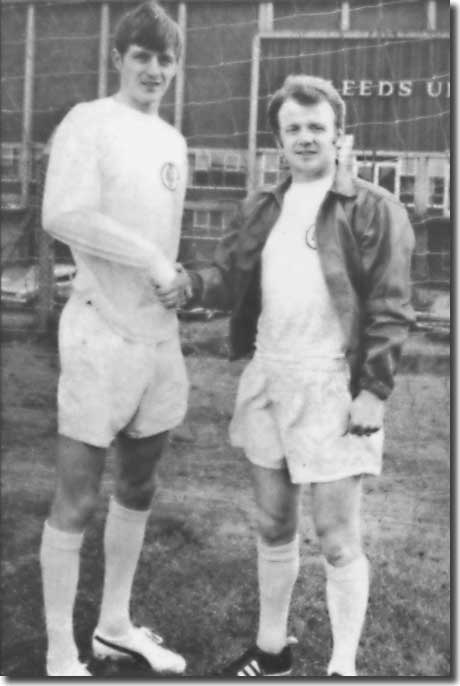
By the time Leeds United won the
league title in 1969, Don Revie
was already laying plans for the following campaign. Championship success
owed everything to defensive fortitude, for the team lacked cutting edge.
Revie was reconciled to the need for a proven goalscorer.
Rumours resurfaced of an interest in Hibernian's Peter Cormack,
but when the news broke in June that relegated Leicester City had transfer-listed
Allan Clarke, it quickly became clear he was the number one target.
Revie was the first to declare his hand, but faced competition
from other leading clubs, for Clarke was hot property. The subject of
a record £150,000 transfer in 1968 when leaving Fulham, he was man of
the match in Leicester's FA Cup final defeat and strongly tipped for England's
World Cup squad, having scored twice in the 4-0 defeat of a Mexican XI
on the summer tour.
Revie was relentless in his pursuit, and on 24 June signed
Clarke in a record £165,000 deal.
The new man was delighted, telling the Yorkshire Evening
Post: 'I had been keeping my fingers crossed since near the end of
last season ... that Leeds would come for me.'
There was some speculation that Clarke might be a disruptive
influence, as acknowledged by Billy Bremner: 'I had played against him
and knew what his ability was like, but he also had a reputation for being
the sort of person who kept himself to himself and didn't have much to
do with the rest of the squad.'
There was newspaper talk that Clarke's arrival would prompt
the departure of Peter Lorimer, already unsettled at being in and out
of the team. United announced that South
African winger Albert Johanneson, long out of the picture, was available
for transfer at 'a very modest fee', while there were even questions about
the future of Paul Madeley. When asked, Revie said: 'These players are
part of the set-up here. They have a vital part to play.'
The board's readiness to fund a record deal was evidence
of their now unconditional support for Revie. A
few years earlier, they refused to meet the asking price for Alan Ball,
but this time there was no argument. And why should there be? Even after
the Clarke deal, in a year when United also cleared a balance of £135,297
owing for work on the stadium and state of the art floodlights, the club's
finances remained healthy under Revie's stewardship.
A loss of £45,682 was declared, breaking the run of profits
returned solidly since 1964, but only after accounting for the expenditure
on Clarke and the stadium. Employee costs had soared to £202,425, with
the top earner (shown in the accounts as receiving between £12,500 and
£15,000) widely thought to be Revie himself. Sidney Simon, chair of the
club's Finance Committee, declared the directors 'very satisfied with
the year's workings'.
Improvement of the much maligned playing surface at Elland
Road was a priority for the summer months; it had been devastated by frost
and the constant use of straw and braziers to keep it playable. Renovation
was essential, but a short close season ruled out reseeding. The club
decided instead to ferry in new turf from Leicestershire.
Chairman Percy Woodward revealed that work on the West Stand
extension would start earlier than anticipated, in August, with the aim
of completion by mid-February. The extension would provide 2,500 more
seats and 300 more standing places.
back to top
Some months later it was revealed that there had been insufficient
time to fit new drains. Director and grounds committee chairman Bob Roberts
admitted that he had no plans of the existing drainage system and expressed
doubts that the pitch had ever been properly drained. 'Even when we dug
the foundations for the new West Stand after the
fire (in 1956) I could find no main drain exit, although when we were
excavating for the floodlight pylons often we found traces of old field
drains. The field will have to be drained, of course, but it will be next
season before it can be done. We can only hope for dry weather this winter.'
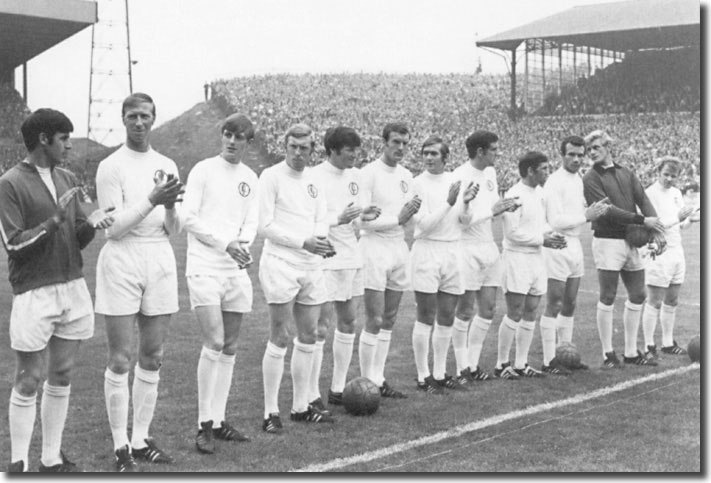 There
was also some discussion about the possibility of under soil heating.
There
was also some discussion about the possibility of under soil heating.
Revie was publicly guarded about the chances of silverware,
but in the privacy of the dressing room, he was upbeat, setting his sights
on the 'impossible' treble of league, Cup and European Cup. He later acknowledged
the enormity of his ambition: 'The deliberate aim of a treble was nothing
short of fantastic. We were going in search of a miracle.'
United's season commenced with the FA
Charity Shield match against Manchester City at Elland Road on 2 August.
Allan Clarke debuted up front alongside Mick Jones, and won critical acclaim
for his contribution to a 2-1 victory that brought the fillip of early
silverware.
Preparations continued with a closely fought friendly at
Celtic the following Tuesday, in front of a 65,000 crowd. Substitute Mick
Bates gave Leeds a 58th-minute lead, cancelled out six minutes later by
Bobby Lennox. The side earned positive headlines for a decent display.
The opening league game, on 9 August, was at home to Tottenham.
With Jones carrying a hip injury from the City game, England
winger Mike O'Grady was recalled; Clarke at centre-forward was partnered
by Lorimer. Madeley covered for the suspended Terry Cooper at left-back.
Sprake, Reaney, Bremner, Charlton, Hunter, Giles and Gray continued from
the selection that went largely unchanged through the championship campaign.
It was planned that Jack
Charlton's 500th League appearance would be commemorated by a presentation
before kick off, but there was a shock waiting for the big centre-half
when he returned from Glasgow.
Terry Lofthouse in the Evening Post: 'The piece of
inscribed silver will now be held in custody until the following Wednesday,
when Arsenal visit Elland Road. United's records for the 1965/66
season are incorrect in that they credit Charlton with playing at
Sunderland on 29 January, when, in fact, he was out with a ricked neck
... It's only now that the error has been discovered.'
United were quickly into their stride against Tottenham.
Billy Bremner scored the first after 15 minutes when he got his head to
a Norman Hunter shot to deflect it into the net.
Allan Clarke enjoyed some excellent moments and opened his
United account in the 57th minute. Centre-half Mike England tried to nod
a bouncing through ball back to keeper Pat Jennings, but misjudged it
and his header lobbed up invitingly for the razor-sharp Clarke to race
through and nod over the advancing Jennings.
Jimmy Greaves pulled one 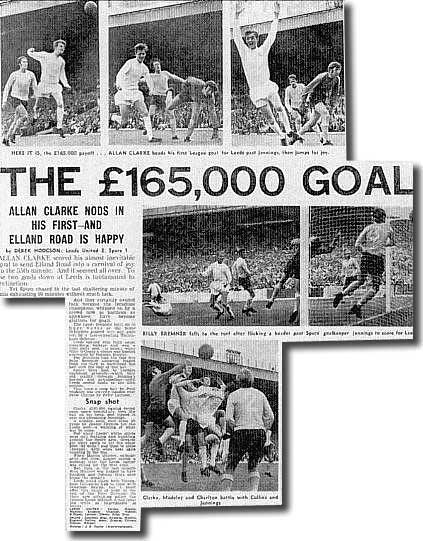 back
for Spurs with five minutes remaining and the goal hinted at an unlikely
comeback but Johnny Giles made the points safe from the penalty spot a
couple of minutes later.
back
for Spurs with five minutes remaining and the goal hinted at an unlikely
comeback but Johnny Giles made the points safe from the penalty spot a
couple of minutes later.
Charlton injured his ankle and would have to go on waiting
for his landmark appearance. For the midweek match against Arsenal, Madeley
switched to centre-half with Cooper back from suspension.
The game was goalless, extending United's unbeaten league
run to 30 matches. That equalled a record set 48 years previously by Burnley.
There was nothing else joyous about what The Times reported as
'a bruising, ill-tempered game which was extended by 12 minutes of injury-time'.
Leeds wound up the pressure, but, with Peter Storey provided
a smothering blanket in front of his defence, the Gunners were stubbornly
resistant. Clarke netted at the start of the second half but the effort
was chalked off for offside against Giles.
back to top
Phil Brown was scathing in the Evening Post: 'If
Leeds United had played in London like Arsenal did in Leeds, they would
have been scarified by Fleet Street. They have been assailed for far less
than the Gunners did last night. This was to offer a nine and ten man
defence, to make no pretence of attacking, to give 13 corners to one,
to make but one shot, to foul every man on United's side except Sprake.'
Clarke suffered a cut eye in the fourth minute and Cooper
went off later in the half for attention to a facial injury, returning
with two teeth partially dislodged. They had to be extracted after the
game.
Mick Jones was fit to resume his partnership with Clarke
for the weekend visit to Nottingham Forest, with O'Grady dropping to the
bench. Jones' presence brought some improvement and United won 4-1. The
two strikers' combination work and hold up play brought new dimensions
to United's game; close marking of the duo left space for others, and
Lorimer, Gray and Giles each crowned impressive displays with a goal.
Clarke was booked in the game's opening sixty seconds for
fouling Ian Storey-Moore, but his team were never seriously troubled after
an initial flurry of free kicks. However, Leeds took an age to get going:
Clarke broke the deadlock after 68 minutes with his 100th League goal,
a fine glancing header.
That victory broke the First Division record for games unbeaten
and the run continued with a 1-1 draw at Arsenal, smashing the Football
League record of 31, set by Liverpool in the Second Division in 1894.
United should have won easily, but fell behind in the eighth
minute. Gary Sprake went to claim a 40-yard free kick that floated wide
of the posts. Under pressure from Charlie George, he got his fingers to
the ball but fumbled, allowing it to hit the upright and roll into the
net. It was the 80th minute before Lorimer's fierce drive brought an equaliser.
Geoffrey Green in The Times: 'This was the hard,
modern game between two sides with their eyes on some sort of prize before
the end of the season ... Yet the output of their two meetings in one
week, three hours of hard football, brought just two goals and five players
booked by the referee ... There was little deep pleasure or wit.'
United were then held to another 1-1 draw, at home to Newcastle,
after taking the lead with Mick Jones' first goal of the campaign. Jones
scored again, in a third successive 1-1 draw, on 26 August at Burnley,
the game in which Jack Charlton finally achieved his 500th appearance.
The succession of dropped points left Leeds trailing in
the wake of pace setters Everton, who had dropped just one from their
opening six matches. They looked outstanding, inspired by the midfield
work of the Three Graces, Ball, Kendall and Harvey.
Phil Brown reviewed the opening month in his Saturday column
for the Evening Post on 30 August, as United travelled to meet
the Goodison Park club: 'Clarke has settled into the side very smoothly
... His sharp work in attack has reduced the far too heavy weight of marking
that Jones was carrying in the middle of last season and Jones has benefited
accordingly. But I would like to see United play more directly up the
middle to these two. There is for me too much crossfield passing and running
behind them. They are two of the best middle men in the game and if they
can be joined up front occasionally by Bremner and Madeley, United's forwards
should get some useful scores, or at least assist their colleagues to
them, for in this United side anybody can take a chance.'
The Everton clash was a mouth-watering prospect, even so
early in the season.
United set out to keep Alan Ball quiet, but their preoccupation
with the England man left Jimmy Husband, Johnny Morrissey and Joe Royle
free to wreak havoc.
Everton were quickly off the mark and scored after five
minutes. Husband headed goalwards from the back post as a free kick came
in. It came out again and he shot, but saw it charged down. Again he reacted
first and his second shot was deflected into the net. Royle added a second
after 20 minutes, nodding in the rebound after his first header had crashed
against the bar. In the 49th minute, Royle made it 3-0, floating home
a speculative lob from the corner of the area.
It looked an unassailable lead, but United fought on. Within
three minutes they had pulled one back, Billy Bremner chesting home Giles'
corner at the back post.
back to top
That goal revived the Whites and they pushed on with Clarke
adding a second, profiting after Cooper and Lorimer had laid on a chance.
He also tested Gordon West on two more occasions without quite getting
an equaliser as Leeds went down by the odd goal in five.
Eric Todd in The Guardian: 'I imagine that the Leeds
manager reserved his more forthright comments for the United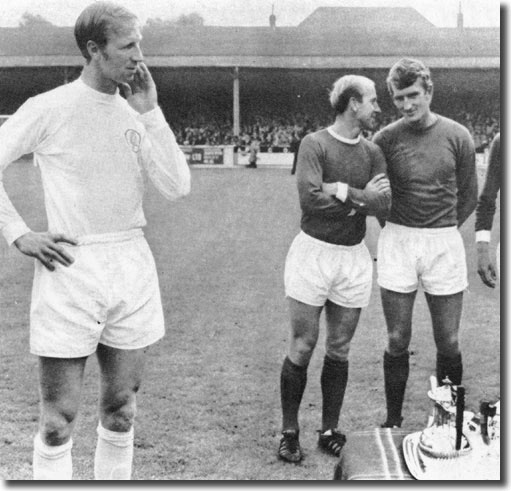 defenders. For Charlton was routed by Royle; Reaney, so to say, did not
know what day it was; and Sprake again betrayed discomfort as well as
displeasure because Leeds were being beaten. The sight of Charlton gesticulating
to Reaney to get upfield, and that of Reaney giving an illustrated answer
were foreign to the strict self discipline with which Leeds more recently
have been associated.
defenders. For Charlton was routed by Royle; Reaney, so to say, did not
know what day it was; and Sprake again betrayed discomfort as well as
displeasure because Leeds were being beaten. The sight of Charlton gesticulating
to Reaney to get upfield, and that of Reaney giving an illustrated answer
were foreign to the strict self discipline with which Leeds more recently
have been associated.
'Leeds, as if conforming to some political manifesto, insisted
on full employment for all, and obviously they had no intention of trying
to score unless all their 11 men had a part in the act. So they spent
too much time and effort, used too many men and passes in their approach.
When they arrived eventually in the Everton penalty area, they'd forgotten
what they'd come for.'
After the game Don Revie held discussions with Mike O'Grady,
who had been agitating for a first team recall. The two men could not
see eye to eye and the winger was transfer listed. United fans were furious,
one complaining to the Evening Post, 'O'Grady's absence from the
team is one of the main reasons why it has not been scoring the vital
goals.' Within a fortnight Wolves had tabled an £80,000 bid. O'Grady could
not agree personal terms with the Molineux club but remained on the transfer
list.
Leeds won for the first time in five attempts when an under
strength selection beat Third Division Fulham in the League Cup, but then
had to rely on a late equaliser from Billy Bremner to earn a point in
a 2-2 draw at home to Manchester United. The skipper's goal was outstanding:
O'Grady, on as sub for Gray, sent a huge lobbed cross to the far post
for Charlton to nod inside. Bremner, standing with his back to goal, launched
himself into a spectacular bicycle kick that left Stepney grasping thin
air.
Gary Sprake faced criticism for a poor display. There were
rumours that the keeper would be dropped after a number of errors. Don
Revie stoutly defended Sprake but admitted that the side wasn't playing
well.
After six league games without a win, United secured a 2-1
victory at Sheffield Wednesday on 13 September. They enjoyed the bulk
of possession but struggled to score. The winner came from a rare incisive
move when Bremner's ball through a square defence allowed Eddie Gray to
race into the space behind and fire home right-footed.
The growing doubts were eradicated a few days later when
United made their European Cup debut. A new club record was set when they
slaughtered the Norwegian amateurs Lyn
Oslo 10-0 with O'Grady back in the side and opening the scoring within
a minute. Mick Jones netted a hat trick on a memorable evening at Elland
Road.
O'Grady owed his recall to Gray's injury against Wednesday;
he deputised again as United beat Chelsea 2-0 on 20 September in an ugly,
over physical encounter, but within three days the wing man had departed
Elland Road. Wolves manager Bill McGarry had refused to accept O'Grady's
original rejection and pursued him until he got a positive response.
Speculation began immediately that Leeds were in the market
for a replacement. Don Revie was quick to quash rumours, declaring, 'I
am sick and tired of all these reports that I am rushing to buy another
winger to replace Mike. Yesterday it was Jimmy Conway of Fulham. Today
it is Jimmy Johnstone of Celtic. Tomorrow it will be, as like as not,
somebody else. Possibly Pele. I have no interest at all in any of these
players ... I have no intention of buying anybody this season.'
The following day, Paul Madeley's 20-yard drive deep into
injury-time snatched a draw in the League Cup against Chelsea. The game
was thankfully less spiteful than the earlier league clash, but the result
left Revie with a headache. The return match against Lyn Oslo was scheduled
for the following Wednesday, a day after the Stamford Bridge replay. Revie
declared that he would pick completely different sides for the two games.
In the end, an accommodation was made with the Football League, and the
Chelsea replay was delayed by a week.
England manager Sir Alf Ramsey was at Coventry on 27 September
to watch United's World Cup hopefuls. Two weeks earlier, Ramsey had named
seven Leeds players - Reaney, Madeley, Cooper, Charlton, Hunter, Clarke
and Jones - in his preliminary squad of 40 for Mexico. All were on duty
at Highfield Road except Charlton, out with a pulled hamstring.
back to top
Terry Lofthouse wrote in the Evening Post of the
Whites' new approach: 'Leeds United may have sacrificed that iron door
barrier designed to keep out the most potent attacks in the country in
favour of a fast flowing all out frontal assault, but it is a change everyone
has welcomed. Their 2-1 triumph at Coventry was a typical example of the
way the Elland Road 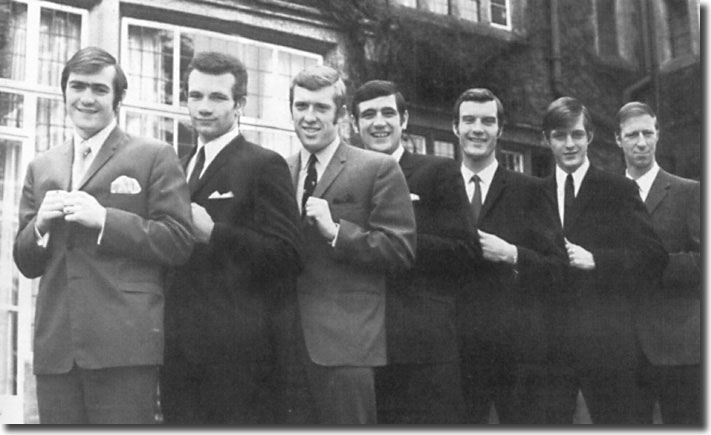 pattern
has altered this season. Freedom to express is now the key note.
pattern
has altered this season. Freedom to express is now the key note.
'United have achieved a brand of play similar to that of
West Ham without fully reaping the benefits of a rip roaring front line.
That is rapidly changing, too, for the Clarke-Jones duo is the most exciting
combination to hit the soccer scene. It will go from strength to strength,
from success to success. The essence of its power is in its simplicity.
Jones confuses and jabs at the opposition, Clarke flits about and takes
up positions which give the impression he is being unmarked. But that's
how the system works. It worked to perfection at Coventry, where the home
side, unbeaten at home since December, went down to the relentless pressure
forced on them by the Leeds super machine.'
Clarke, Hunter and Giles all suffered injuries and were
rested for the return match against Lyn Oslo, joining Charlton on the
sidelines. Rod Belfitt, standing
in for Clarke, opened the scoring in the sixth minute, turning home a
Terry Hibbitt cross. Hibbitt (2),
Jones, Lorimer and Belfitt (again) added further goals as Leeds romped
to a 6-0 win, establishing a new aggregate high score for an English club
in the competition. It seemed for a while that the all time record of
18 by Benfica would be caught. Don Revie admitted to being 'a little disappointed
... When we were six-up with almost 20 minutes to go I thought it was
definitely on.'
It took two penalties from Giles, one in each half, to secure
a 2-1 win on 4 October at Elland Road against a Stoke City side which
was doing surprisingly well. Before the game the two clubs were level
on points and City pushed United all the way, with former White Jimmy
Greenhoff pulling one back with a fine drive from 15 yards.
Greenhoff said afterwards, 'You are always afraid Leeds
will turn it on and cut you to pieces, make you look silly, but they didn't
today. They were off song, weren't they?'
Sprake and Clarke picked up injuries and missed the following
game. Terry Lofthouse in the Evening Post: 'Leeds United lost a
League Cup third round replay 2-0 at Stamford Bridge, but exploded a London
myth. What surely must be finally erased is the southern belief that the
League champions are still a hard, uncompromising, unattractive side ...
Though Chelsea took the honours, the memory was United's fluent, stylish
play.'
Two 1-1 draws followed, at West Bromwich and Crystal Palace.
United badly missed Clarke, who had not figured since the defeat of Stoke
because of an ankle strain. Just as the striker was pronounced fit, Cooper
(knee ligaments) and Giles (hamstring) went missing.
That meant an opportunity for Mick Bates and he did well
against Derby at Elland Road on 25 October; so well, in fact, that the
Evening Post's Phil Brown suggested he should retain his place
ahead of Giles, 'the little Irishman having hit a moderate patch'.
It was the restored Clarke who took the honours, scoring
both goals in the few minutes before the break as Leeds beat the Rams
2-0. County manager Brian Clough protested long and hard after the game
that Clarke had been offside before scoring the second, rounding keeper
Les Green and steadying himself before stroking the ball into an open
goal.
United followed up by hammering Nottingham Forest 6-1 at
Elland Road in midweek.
back to top
Lorimer opened the scoring in the ninth minute after a four-man
move, firing home from the corner of the penalty area. United failed to
build on their lead and in the 27th minute Henry Newton shot through a
packed area to equalise. Leeds regained the lead four minutes before the
break, Clarke allowing the ball to pass him by in the box for the onrushing
Charlton to nudge home.
In the 65th minute, Clarke was carried off after hurting
his shin in a clash with goalkeeper Hill. If there were fears that the
loss of their main striker would blunt Leeds' cutting edge, the reality
was somewhat different.
Five minutes after Clarke's departure, Bates picked up the
ball on the edge of the area and fired home for 3-1. After 80 minutes
Lorimer tapped in the fourth after the ball came back off the bar. Another
two minutes and the Scot completed his hat trick after rounding the keeper.
Substitute Hibbitt completed the rout when he collected a loose ball after
a misunderstanding between Terry Hennessey and keeper Hill.
The Evening Post's Terry Lofthouse praised two men
in form: 'Lorimer thrives on success ... His enthusiasm for the job abounds,
he is constantly calling for the ball and tackling with extra verve. Two
of his goals were comfortable, but the first went in like a bullet ...
Bates again demonstrated maturity as a midfield operator alongside a cool
and composed Bremner.'
United had to settle for a goalless draw at Sunderland,
but then hammered struggling Ipswich 4-0 on 8 November, cementing second
place in the table, six points behind Everton, defeated 2-0 at West Bromwich.
In the absence of Clarke and Belfitt (suspended for an astonishing
six weeks for being dismissed in a Central League game), Don Revie used
Johnny Giles in support of Mick Jones, allowing Bates to continue his
impressive run. The combination paid off against Ipswich and was given
another opportunity as Leeds returned to European Cup action against highly
regarded Ferencvaros.
The first leg of the second round tie was at Elland Road
on 12 November and conditions favoured United. The heavy rain left the
pitch muddy and holding, much to the Hungarians' distaste. Ferencvaros
coach Karoly Lakat was downbeat in his pre-match comments: 'If three key
forwards are out of your side (Albert, Varga and Rakosi) it must give
the opposition confidence. Leeds United have become much stronger since
we last met, while Ferencvaros have gone the opposite way.'
Clarke and Cooper were still out injured, but otherwise
United were at full strength with captain Bremner back after a 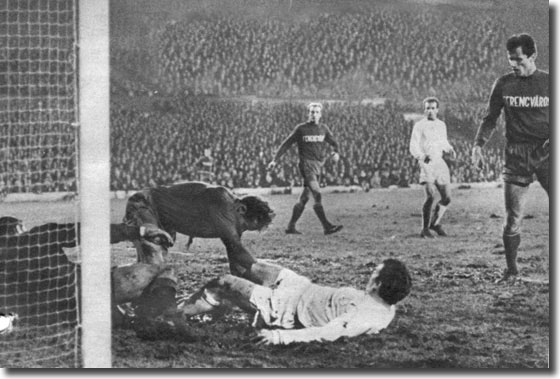 spell
of flu.
spell
of flu.
Any Leeds nerves were quickly settled when Giles opened
the scoring after 80 seconds. The Irishman fed Bremner on the edge of
the area. The skipper, back to goal, moved the ball on with a neat flick
of the heel for Giles to fire home from 12 yards.
After 22 minutes, Jones added a second, placing the rebound
past keeper Geczi after he had blocked a Lorimer effort. Two minutes later
the contest was over. Lorimer's 40 yard ball allowed Giles to slip his
marker and feed Jones. The striker rounded Geczi and scored off a post.
Geoffrey Green in The Times: 'The score in the end
might well have been close to double figures. At a rough count there were
three shots variously from Giles, Jones and Lorimer taken off the Hungarian
line; there were two strikes in the first five minutes of the second half,
by Giles again and then Hunter, both disallowed for fractional offside;
and a blatant penalty denied to Bremner after he'd been rudely sent sprawling
by Pancsics. But on top of that came a fistful of misses, the most blatant
by Jones, and then a clear header by the long legged Charlton, with the
whole goal to aim at, after the interval. Had I not seen it I would not
have believed that a Ferencvaros side so full of talented players could
have been so ground down. Although the great Albert and Rakosi, both of
World Cup standard, were missing, still on the field were five other men
of the Hungarian national side, and three more in their World Cup party,
who will go to Mexico should the Hungarians win their group play-off with
Czechoslovakia.
'By half-time it was mud, mud, and for Leeds at least, glorious
mud ... They played some devastating football, cutting the opposition
to shreds as they moved their passes brilliantly at top speed. In all
this their positional play, control, and skill, were vital factors ...
The mud also became an enemy of Yorkshire throughout the second half.
By then the surface was black, churned, tacky and turning towards the
morass which choked the Leeds flow. Certainly they still pounded forward,
masters of every situation. Here the irrepressible, impish Bremner was
everywhere, at the heart of all the action. No one would have imagined
that he had risen from a bed of influenza only 48 hours earlier.
'At his side too, equally dominating, another ringmaster,
was little Giles; on the left flank Gray ploughed through the elements
like a cruiser, with the tireless Jones a powerful battleship in the middle.
At the back Hunter, Charlton and the rest kept the supply going. Yet those
three goals of the opening stages simply could not be multiplied. It was
no benevolent attitude on the part of Leeds. They still remained hungry.
But perhaps they had been interrupted by over-usage of the ball and were
themselves finally strung up by the mud.'
back to top
With United set fair for a place in the last eight, the
club rewarded Don Revie by buying him a five-bedroomed house, Three Chimneys
at Aldwoodley. Terry Lofthouse reported in the Evening Post: 'Don
Revie today declared his loyalty to League champions Leeds United, despite
the weekend row between himself and the directors. The storm clouds gathered
over a story that he is to take over the £18,000 house owned by Mr Manny
Cussins in the exclusive Sand Moor area ... Team manager Revie hit out
angrily at "what has been brought out about the home and my private
life". He says he is disgusted with the way the matter had been handled
and adds: "What has been said about my salary is laughable - it is
nowhere near £15,000. I only wish it was ... I have turned down bigger
houses than the £18,000 one mentioned and bigger salaries than the quoted
£15,000." He was referring to the fantastic offer he received a while
ago from Italian club Torino, which he rejected because, as he put it
at the time, he is settled in Leeds.'
Torino had offered United £70,000 in May 1969 to buy out
Revie's contract; they had promised Revie a salary of £24,000 plus bonuses.
Chairman Percy Woodward had adamantly refused to be courted, declaring
the manager's contract to be beyond price.
The manager explained his reasons for rejecting Torino's
offer in one of his Saturday columns in the Evening Post.
'I promised the Turin directors I would never divulge the
financial terms, but you can take it from me that if I had accepted I
would have made sufficient money to retire after four years! ... So why
did I refuse?
'There were two reasons as far as I was concerned. Firstly,
I expect 100 per cent loyalty from Leeds United's players and consider
I have a moral duty to be loyal to them. Over the years a tremendous family
spirit has developed within the club - a friendship between the players
and their families and the staff. No amount of money can compensate for
a situation like this.
'Secondly, I believed I would not have proved anywhere near
as successful in Italy ... In fact, I still consider any leading British
manager would be crazy to try his luck on the continent because there
are so many problems involved. Problems, for example, like the language
barrier, temperamental players, and fans. Then there is the strange system
whereby presidents of Italian clubs negotiate all the players' contracts
and transfers.'
United continued to struggle on their travels. A 1-1 draw
at Southampton on 15 November was the fifth game without a win, and there
was more criticism after playing another struggling side at Elland Road.
Terry Lofthouse: 'Leeds United's performance in beating Sunderland 2-0
was as dull as the weather ... It was not until six minutes from the end
that United put some respectability in the scoreline, Lorimer notching
his eighth league goal of the season, after Jones had opened the account
in the 21st minute. With too many players out of touch, they had to struggle
for long periods despite never being hard pressed to hold their early
lead. A sort of lethargy appeared to spread through the Leeds team.'
The next game was at home to third-placed Liverpool. The
Reds started the season among the front 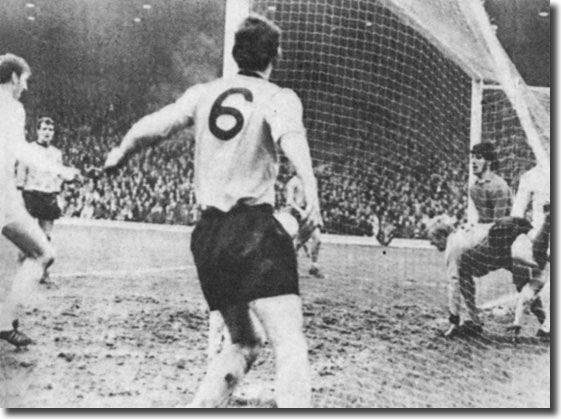 runners,
but had come grinding to a halt, securing just 3 wins and 11 points from
their previous 11 games. But they were certainly no easy touch.
runners,
but had come grinding to a halt, securing just 3 wins and 11 points from
their previous 11 games. But they were certainly no easy touch.
The game was tight but United dominated initially, taking
a 20th-minute lead through a Giles penalty. Instead of pressing home their
advantage, Leeds withdrew into a defensive shell, pulling Madeley deeper
and allowing Liverpool back into the game.
Tom German in The Times: 'The sharply-contrasting
fortunes of the opposing goalkeepers resolved an always eventful tussle
... Liverpool, a goal down, were just starting to pick themselves up after
an hour of scurrying defence when Yeats aimed in a header: it curved to
Sprake's feet, with little power behind it, but as the goalkeeper bent
casually to collect it the ball plopped into the mud, brushed beneath
his fingers without hint of a bounce, trickled between his legs and over
the line. His anguish was apparent, yet it was unquestionably of his own
making. Lawrence's contrasting alertness in the last phase of the match
can only have rubbed salt in Sprake's raw wound. Bremner was hauled down
by the goalkeeper; first it was a penalty, then a free kick to Liverpool
and, finally, the award went to Leeds. But Lawrence unmoved by the minutes
of commotion, flung himself sideways to push Giles' kick aside at a vital
moment in the match. It was to earn Liverpool a deserved point.'
Don Revie was typically supportive of Sprake after the game,
saying, 'I have every faith in him. He has conceded fewer goals in the
last six years than any other goalkeeper in Britain ... When he makes
a mistake he always gets punished.'
It was disappointing, but there was no holding United in
the European Cup. In their return against Ferencvaros on 26 November,
Leeds gave a remarkable display to repeat the 3-0 win they achieved at
Elland Road.
back to top
Albert Barham in The Guardian: 'The sparse crowd
saw a fine exhibition of attacking football from Leeds. Ferencvaros were
no better than they were in the first leg, outplayed, outmanoeuvred, out
thought by the fluent football from every member of Leeds.
'European football certainly suits Jones this season. He
brought his total to eight goals in four matches tonight. His first came
in the 37th minute when he headed in a long tantalising high pass from
Lorimer. Geczi, the goalkeeper, went up with him but Jones beat him to
the ball to head into the net through the narrowest of angles. Then with
10 minutes to go Jones scored his second and what a beauty that was. He
dispossessed Juhasz, beat Balint and shot into the corner of the net.
Finally just before time Lorimer, with a searing drive from 25 yards,
put the seal on this night of Leeds' triumph.'
That historic victory, the first by a British team at the
Nep Stadium, was followed by another, 2-1 at Manchester City, United's
first Maine Road win since 1938. Jones got the winner with three minutes
remaining, heading home from a Lorimer corner.
United were closing fast on Everton, three points behind
and unbeaten in fifteen League games. The key differential between the
sides was the win to draw ratio. Everton had won 16 and drawn 3 games,
against United's 11-10 return.
Leeds improved that record during December, winning three
straight games, all at Elland Road, against Wolves (3-1), Sheffield Wednesday
(2-0) and West Ham (4-1). Allan Clarke made his return against Wolves
after 8 games out and scored, adding two against Wednesday and another
against the Hammers.
The West Ham win left United top for the first time. In
the same period Everton crashed 3-0 at home to Liverpool, and, despite
their two games in hand, the steady pressure was squeezing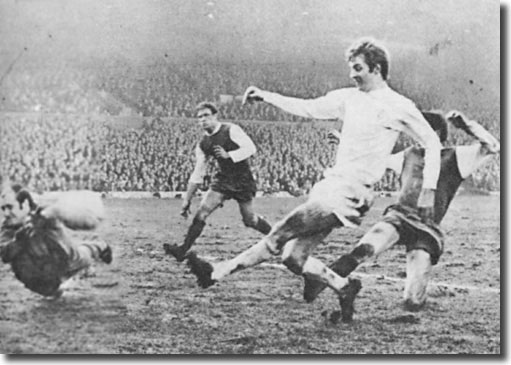 a team that had once looked uncatchable.
a team that had once looked uncatchable.
Everton had started at Tottenham on the same night as Leeds
beat West Ham, but the game was abandoned after half an hour when the
floodlights failed. The Merseysiders regained the leadership on 20 December
after beating Derby 1-0 and went on to beat Manchester City by the same
score three days later. On each occasion they missed a penalty and had
to rely on a late goal to secure the points.
United's 20 December game at Manchester United was off due
to a snowbound pitch; they had the chance to close the gap on Boxing Day,
with Everton gameless, but would have to get something out of Newcastle
at St James' Park to do so.
Leeds were guilty of over elaborating and Newcastle took
a 2-0 lead. Wyn Davies had the better of Jack Charlton, scoring once and
laying on a second for Bryan Robson. United launched a tremendous revival
over the last half hour and Giles pulled one back from 25 yards. It was
not enough and Newcastle inflicted United's first League defeat since
August.
The Whites had no time to feel sorry for themselves; the
following day they hosted Everton in a top of the table showdown.
Despite the lack of rest, United overpowered Everton, dominating
the first half of an uncompromising contest and scoring after a quarter
of an hour. From Bremner's 30 yard punt, Lorimer nodded down into the
six yard box. Jones tangled with Gordon West and flicked the ball into
the net as the keeper fumbled.
After 30 minutes it was 2-0 when Jones rose high to nod
home Lorimer's cross from the right.
Everton fought hard after the break and pulled one back
when Whittle ran in to slide a Royle header past Sprake.
Leeds United Book of Football No 2: 'It was the cue
for Everton, who had been playing some fine football in this second half
spell, to pile on the pressure and drive all out for an equaliser. But
in the event, it was Leeds who returned to the attack, and more than once
they almost increased their lead. Although they had a let off, themselves,
with but three minutes to go, when a fine left wing move by Everton ended
with Morrissey shooting on the run ... and seeing his shot hit an upright.
Everton might have bemoaned their cruel luck over this; but had they snatched
a point it would have been unfair on Leeds, who had been on top for so
much of the game - and played a brand of attacking football which thoroughly
earned them their victory.'
The win wasn't enough to put them back on top, but it crowned
a tremendous year which ended with them within a whisker of their main
title rivals.
1970 would see Leeds continue in hot pursuit of three major
trophies.
Part 2 - Treble heartbreak - Results
and table
back to top













 There
was also some discussion about the possibility of under soil heating.
There
was also some discussion about the possibility of under soil heating. back
for Spurs with five minutes remaining and the goal hinted at an unlikely
comeback but Johnny Giles made the points safe from the penalty spot a
couple of minutes later.
back
for Spurs with five minutes remaining and the goal hinted at an unlikely
comeback but Johnny Giles made the points safe from the penalty spot a
couple of minutes later. defenders. For Charlton was routed by Royle; Reaney, so to say, did not
know what day it was; and Sprake again betrayed discomfort as well as
displeasure because Leeds were being beaten. The sight of Charlton gesticulating
to Reaney to get upfield, and that of Reaney giving an illustrated answer
were foreign to the strict self discipline with which Leeds more recently
have been associated.
defenders. For Charlton was routed by Royle; Reaney, so to say, did not
know what day it was; and Sprake again betrayed discomfort as well as
displeasure because Leeds were being beaten. The sight of Charlton gesticulating
to Reaney to get upfield, and that of Reaney giving an illustrated answer
were foreign to the strict self discipline with which Leeds more recently
have been associated. pattern
has altered this season. Freedom to express is now the key note.
pattern
has altered this season. Freedom to express is now the key note. spell
of flu.
spell
of flu. runners,
but had come grinding to a halt, securing just 3 wins and 11 points from
their previous 11 games. But they were certainly no easy touch.
runners,
but had come grinding to a halt, securing just 3 wins and 11 points from
their previous 11 games. But they were certainly no easy touch. a team that had once looked uncatchable.
a team that had once looked uncatchable.